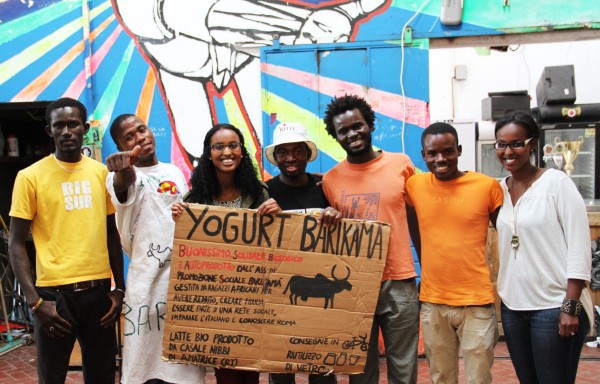By Francesca Ferrario*
For the Founders of Barikamà the still quietness of Casale di Martignano — less than 40km from Rome — is the next chapter after the notorious Rosarno revolt, which in 2010 denounced a sad reality of racism and exploitation in southern Italy. In the little village near the Italian capital, a team of eight people produce yogurt and vegetables, which they sell at markets and deliver at customers’ doorstep around Rome.
The beginning of this story dates back to 2011 when Suleman and Seydou, respectively from Mali and Gambia, reached Rome from Rosarno. There, they obtained residence and working permits and started thinking about their future. Suleman recalls that year as the chance to put an end toan extremely precarious economic and social life.
“We thought about yogurt because it is a simple product” says Suleman, reminding to the notion that simple solutions are the best remedies for complex situations. “In many parts of Africa, it is a very common product. It’s made locally, even though with a different procedure with respect to the Italian one.”
Loyal to the principle of simplicity, they started their project by making friends. They befriended regular Roman citizens and circulated the voice that they were looking for a location where they could start producing yogurt. This led them to meet ‘someone who knew someone’ with some land in Casale di Martignano who could probably help them. And with luck as a reward, this resulted being the right finding.
Now at the farmhouse in Casale, Barikamà buys milk for the production of yogurt and cultivates a piece of land they got in concession to grow vegetables. “Initially, we just used to make yogurt and could afford to buy only 15 liters of milk a week. We got our initial capital of €30 from a friend of us and started selling at local markets.” The beginning was hard because many customers didn’t trust products without any certification.
However, after observing buyers at the market, they figured that the best attitude was not to force customers to buy. “We used to say that that was the yogurt we produced and we believed was very good quality. We used to tell customers that if they buy it, they’d help us, if not it would be ok anyway” told us Suleman. Apparently, this was the right attitude: the team now counts eight members, six from West African countries (Mali, Guinea, Senegal, Gambia, Benin) and two Italians with autism. Every week, they sell 200 liters of yogurt and the vegetables they grow; moreover, they have introduced a home delivery service using donated bicycles fixed in public bicycle workshops.
The revival of organic farming in Italy works in favour of Barikamà which provides completely natural products with no chemical additives. Unlike other producers and distributors of organic items, everything is done in complete respect of the environment. Beside cycle deliveries and organic farming, they recycle what they can including yogurt jars sterilising them before every use. Suleman says that, “I am not aware of other groups doing similar things to what we do.”
A part from their great respect from the environment, the element that differentiates Barikamà is the objective of the company. The Malian entrepreneur tells us that the aim of the team is to grow big enough to offer jobs to “brothers like us who travel a long way from faraway countries to find employment here.” This would help migrants learn Italian, and find support in a completely foreign environment. Suleman adds that “it would be great to start activities in Africa to sell our products. It would be a cultural and economic bridge with Italy.”
The next more immediate steps, however, are consolidating Barikamà’s customer base and increasing its productivity. “We need to reach out to more buyers and to get better tools to grow our vegetables, particularly a bigger tractor.” With more selling point, a stronger network and more collaborators, the team is confident to keep expanding. There is great optimism in the team and Suleman, who is about to become father, smiles to the future.
*Francesca Ferrario manages the MigrantEntrepreneurs Europe website, a storytelling platform on migrant entrepreneurship in Europe.
You can read the original article here.

Leave a Reply